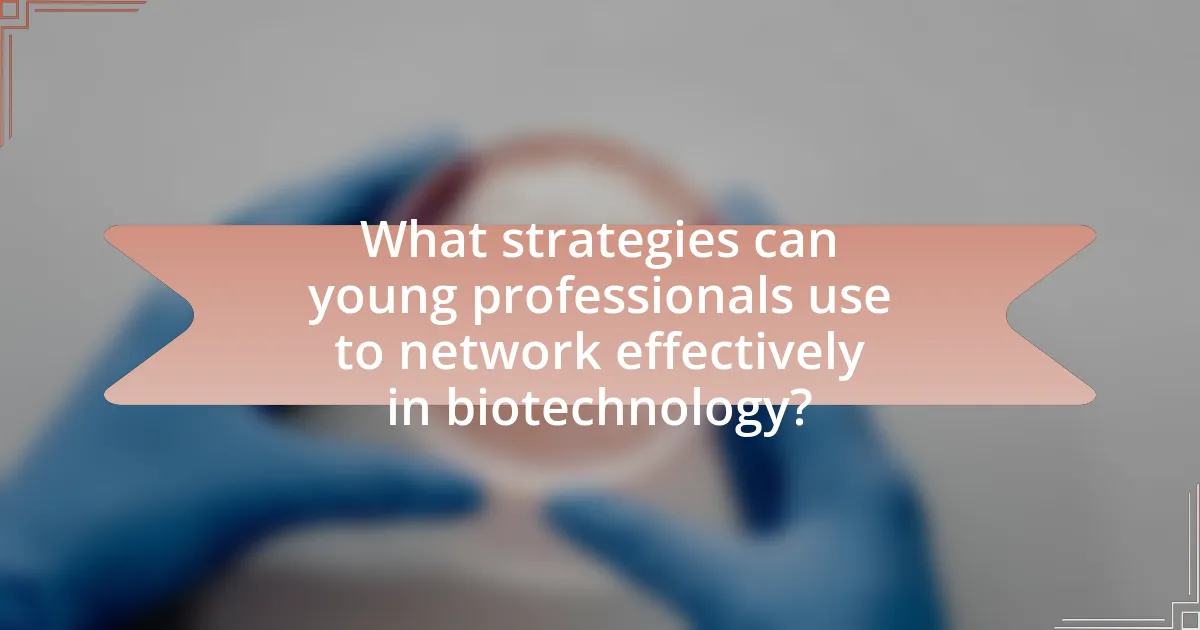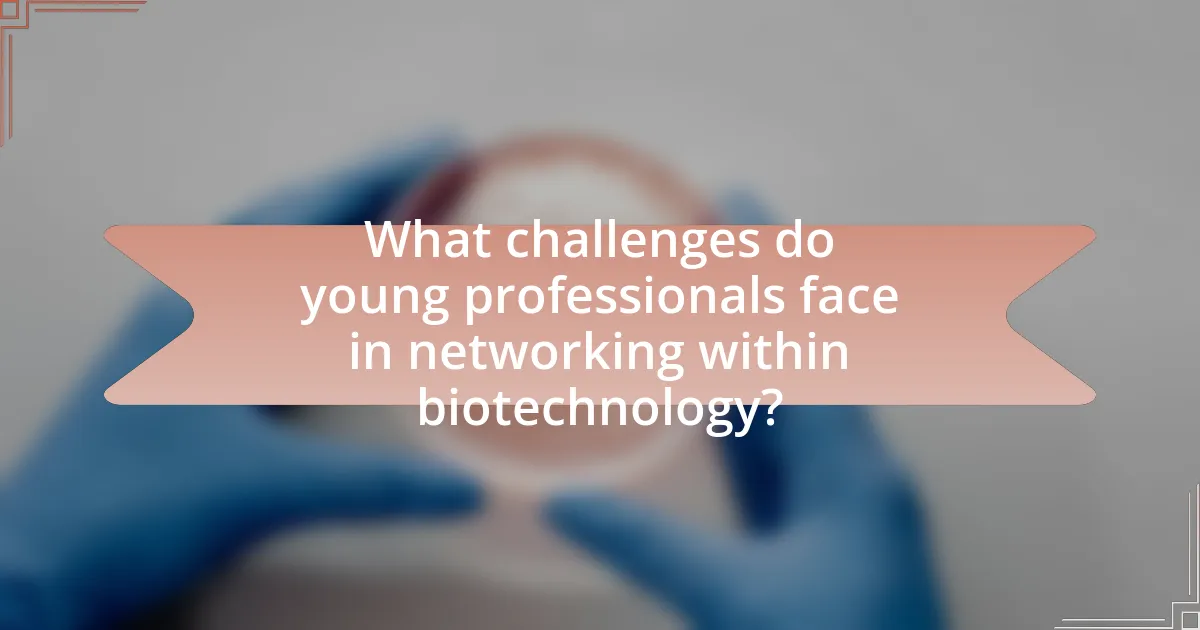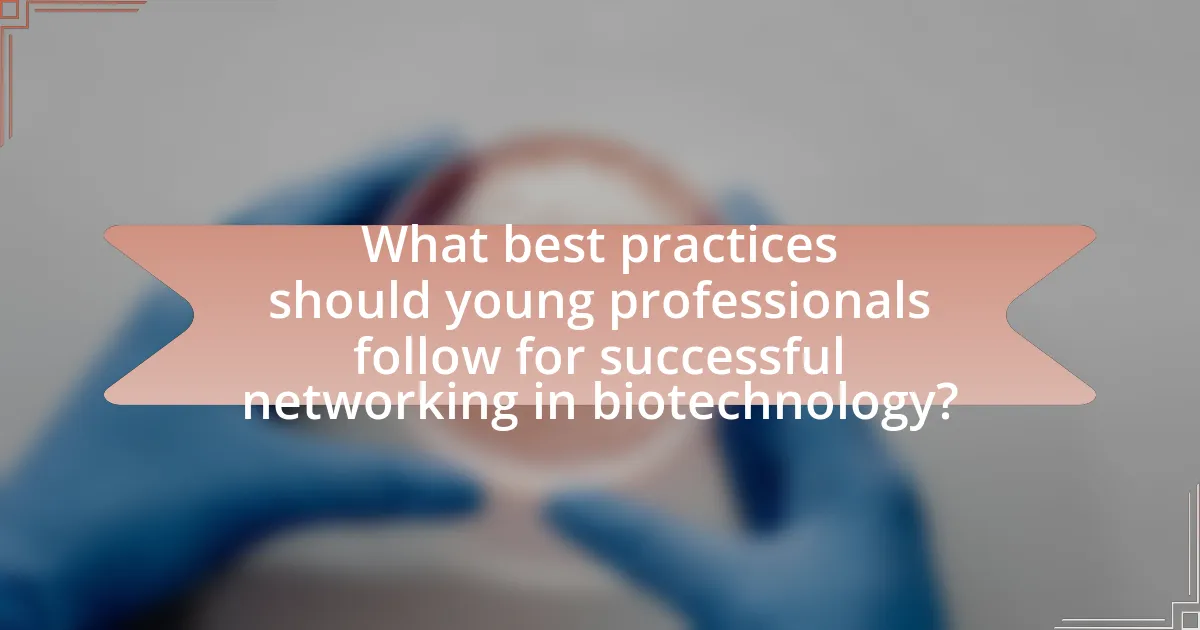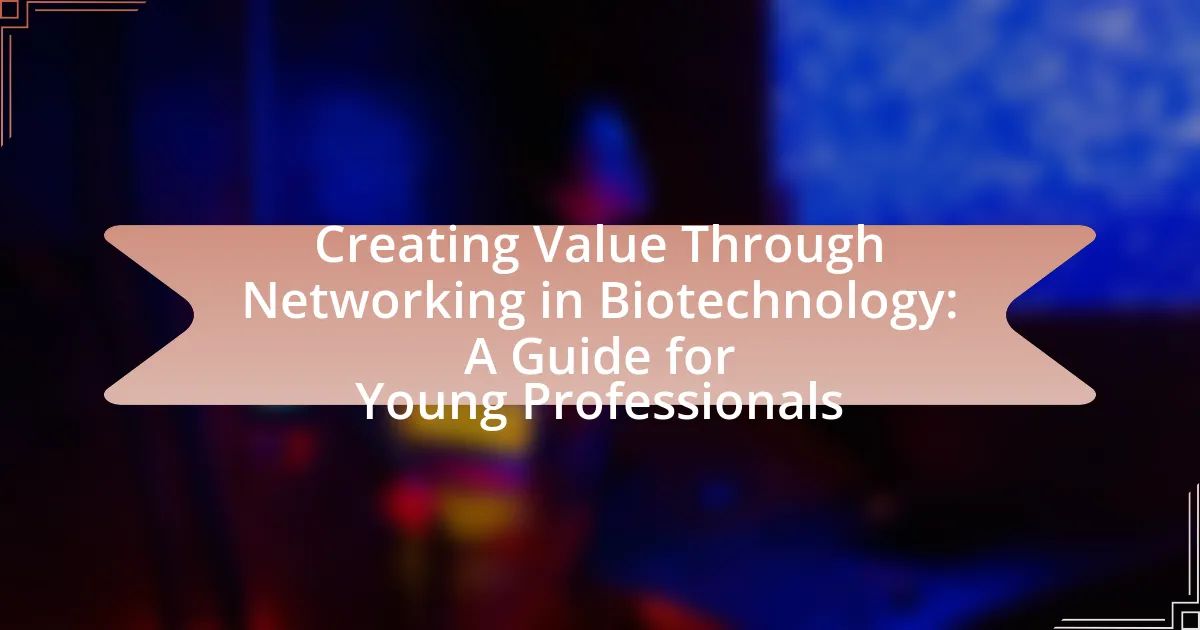Creating value through networking in biotechnology is essential for young professionals seeking to advance their careers in this complex and rapidly evolving field. The article outlines how effective networking fosters collaboration, innovation, and access to resources, significantly enhancing opportunities for mentorship and funding. Key elements of successful networking include building genuine relationships, leveraging industry events, and utilizing online platforms. Additionally, the article addresses the unique challenges faced by young professionals in biotechnology and provides strategies to overcome these barriers, emphasizing the importance of preparation, follow-up, and active engagement in both in-person and online networking environments.

What is Creating Value Through Networking in Biotechnology?
Creating value through networking in biotechnology involves establishing and nurturing professional relationships that facilitate collaboration, knowledge sharing, and access to resources within the industry. These connections can lead to innovative partnerships, funding opportunities, and the exchange of expertise, which are crucial for advancing research and development in biotechnology. For instance, a study by the National Institutes of Health highlights that collaborative networks significantly enhance the success rate of biotech startups by providing access to mentorship and investment.
How does networking contribute to value creation in biotechnology?
Networking contributes to value creation in biotechnology by facilitating collaborations that enhance innovation and resource sharing. Through networking, biotechnology professionals can connect with researchers, investors, and industry leaders, leading to partnerships that accelerate the development of new technologies and therapies. For instance, a study published in the Journal of Biotechnology highlights that companies engaged in strategic alliances are 50% more likely to introduce innovative products to the market compared to those that operate in isolation. This collaborative environment not only fosters knowledge exchange but also attracts funding and expertise, ultimately driving growth and competitive advantage in the biotechnology sector.
What are the key elements of effective networking in this field?
The key elements of effective networking in biotechnology include building genuine relationships, leveraging industry events, and utilizing online platforms. Building genuine relationships fosters trust and collaboration, which are essential in a field that relies on partnerships for innovation. Leveraging industry events, such as conferences and seminars, provides opportunities to meet influential professionals and gain insights into current trends. Utilizing online platforms, particularly LinkedIn, allows for broader connections and the sharing of knowledge, which is crucial in a rapidly evolving industry. These elements collectively enhance professional visibility and open doors to career advancement opportunities.
How does networking differ in biotechnology compared to other industries?
Networking in biotechnology differs from other industries primarily due to its emphasis on interdisciplinary collaboration and regulatory complexities. In biotechnology, professionals often need to connect with experts across various fields such as molecular biology, bioinformatics, and regulatory affairs to drive innovation and ensure compliance with stringent regulations. This necessity for diverse expertise is less pronounced in many other industries, where networking may focus more on specific sectors or roles. Additionally, the biotechnology sector is heavily influenced by partnerships with academic institutions and government agencies, which is less common in industries like retail or manufacturing. This unique landscape necessitates a tailored approach to networking that prioritizes building relationships with a wide range of stakeholders, including scientists, regulatory bodies, and investors, to facilitate research and development.
Why is networking essential for young professionals in biotechnology?
Networking is essential for young professionals in biotechnology because it facilitates access to industry knowledge, job opportunities, and mentorship. In the rapidly evolving field of biotechnology, connections with experienced professionals can provide insights into emerging trends and technologies, which are crucial for career advancement. According to a survey by the National Association of Colleges and Employers, 85% of jobs are filled through networking, highlighting its importance in securing positions within competitive sectors like biotechnology. Additionally, networking can lead to collaborations on research projects, enhancing both professional growth and contributions to the field.
What opportunities does networking provide for career advancement?
Networking provides opportunities for career advancement by facilitating connections that can lead to job referrals, mentorship, and access to industry insights. These connections often result in increased visibility within the field, which can enhance professional reputation and open doors to new roles. For instance, a study by LinkedIn found that 85% of jobs are filled through networking, highlighting its critical role in career progression. Additionally, networking can provide access to exclusive events and conferences, where professionals can learn about emerging trends and innovations in biotechnology, further enhancing their career prospects.
How can networking enhance knowledge and skills in biotechnology?
Networking enhances knowledge and skills in biotechnology by facilitating access to diverse expertise and resources. Engaging with professionals in the field allows individuals to share insights, discuss emerging trends, and collaborate on innovative projects. For instance, attending biotechnology conferences can provide exposure to cutting-edge research and methodologies, while connecting with mentors can offer guidance on career development and technical skills. Research indicates that 70% of jobs are found through networking, underscoring its importance in professional growth. Additionally, collaborative efforts often lead to the exchange of best practices, which can significantly improve one’s technical proficiency and understanding of complex biotechnological concepts.

What strategies can young professionals use to network effectively in biotechnology?
Young professionals can network effectively in biotechnology by attending industry conferences and workshops, leveraging online platforms, and engaging in professional organizations. Attending conferences such as the Biotechnology Innovation Organization (BIO) International Convention allows young professionals to meet industry leaders and peers, facilitating valuable connections. Utilizing online platforms like LinkedIn enables them to showcase their expertise and connect with professionals in the field. Additionally, joining organizations such as the American Society for Microbiology provides access to networking events and resources that enhance professional relationships. These strategies are supported by the fact that networking is crucial in biotechnology, where collaboration and partnerships drive innovation and career advancement.
How can young professionals identify valuable networking opportunities?
Young professionals can identify valuable networking opportunities by actively participating in industry-specific events, such as conferences, workshops, and seminars related to biotechnology. Engaging in these events allows them to connect with established professionals, gain insights into industry trends, and discover potential collaborations. According to a study by the National Association of Colleges and Employers, 85% of jobs are filled through networking, highlighting the importance of building relationships in one’s field. Additionally, utilizing platforms like LinkedIn to follow industry leaders and join relevant groups can further enhance their networking efforts, providing access to discussions and events that may not be widely advertised.
What types of events should they attend to maximize networking potential?
Young professionals in biotechnology should attend industry conferences, workshops, and networking events to maximize their networking potential. Industry conferences, such as the Biotechnology Innovation Organization (BIO) International Convention, attract key stakeholders, including researchers, investors, and industry leaders, providing opportunities for meaningful connections. Workshops often focus on specific skills or technologies, allowing attendees to meet like-minded individuals and experts in their field. Networking events, such as local meetups or professional association gatherings, facilitate informal interactions that can lead to collaborations and mentorship opportunities. These types of events are proven to enhance professional relationships and career advancement in the biotechnology sector.
How can online platforms facilitate networking in biotechnology?
Online platforms facilitate networking in biotechnology by providing accessible communication channels and collaborative tools that connect professionals across the globe. These platforms, such as LinkedIn, ResearchGate, and specialized forums, enable users to share research, seek mentorship, and collaborate on projects, thereby enhancing professional relationships. For instance, a study published in the Journal of Biotechnology in 2021 highlighted that 70% of biotechnology professionals reported finding job opportunities through online networking platforms, demonstrating their effectiveness in fostering connections within the industry.
What approaches can enhance networking interactions?
To enhance networking interactions, professionals should prioritize active listening, personalized follow-ups, and leveraging social media platforms. Active listening fosters genuine connections by demonstrating interest and understanding, which can lead to more meaningful exchanges. Personalized follow-ups, such as sending tailored messages after initial meetings, reinforce relationships and show appreciation for the interaction. Leveraging social media platforms, particularly LinkedIn, allows professionals to maintain visibility and engage with their network regularly, facilitating ongoing communication and collaboration opportunities. These approaches are supported by research indicating that effective networking significantly increases career advancement and collaboration in professional settings.
How can young professionals prepare for networking conversations?
Young professionals can prepare for networking conversations by researching the individuals and organizations they plan to engage with, which allows for informed discussions. This preparation includes understanding the background, interests, and recent achievements of the people they will meet, as well as familiarizing themselves with industry trends and relevant topics in biotechnology. According to a study by the National Association of Colleges and Employers, 80% of job openings are filled through networking, highlighting the importance of being well-prepared to make meaningful connections.
What role does follow-up play in maintaining networking relationships?
Follow-up is crucial in maintaining networking relationships as it reinforces connections and demonstrates genuine interest. Regular follow-up helps to keep communication lines open, allowing for the exchange of ideas and opportunities. Research indicates that 70% of professionals believe that consistent follow-up is essential for building lasting relationships, as it shows commitment and reliability. By engaging in follow-up, individuals can solidify their presence in their network, making it more likely that they will be remembered and considered for future collaborations or opportunities.

What challenges do young professionals face in networking within biotechnology?
Young professionals in biotechnology face several challenges in networking, primarily due to the industry’s complexity and rapid evolution. The intricate nature of biotechnology requires a deep understanding of scientific concepts, which can create barriers for newcomers who may lack the necessary expertise or confidence to engage with established professionals. Additionally, the competitive landscape of the field often leads to limited opportunities for meaningful connections, as many experienced professionals may prioritize their existing networks over engaging with newcomers. Furthermore, geographical limitations can hinder access to key industry events and conferences, which are crucial for networking. According to a survey by the Biotechnology Innovation Organization, 70% of young professionals reported difficulty in finding mentors, highlighting the challenge of establishing relationships that can facilitate career growth in this specialized sector.
How can young professionals overcome common networking barriers?
Young professionals can overcome common networking barriers by actively seeking mentorship and utilizing online platforms for connection. Engaging with experienced professionals through mentorship provides guidance and insights, which can ease the intimidation often felt in networking situations. Additionally, platforms like LinkedIn facilitate connections with industry peers and leaders, allowing young professionals to expand their network without the pressure of in-person interactions. Research indicates that 70% of jobs are found through networking, highlighting the importance of building relationships in professional growth.
What strategies can help build confidence in networking situations?
To build confidence in networking situations, individuals should prepare thoroughly by researching attendees and practicing their introduction. Preparation allows individuals to engage meaningfully, as knowing the background of others can facilitate relevant conversations. Additionally, practicing introductions and key talking points can reduce anxiety and enhance delivery. Research indicates that individuals who practice their networking skills report higher confidence levels and more successful interactions, as highlighted in studies on social anxiety and communication effectiveness.
How can young professionals navigate networking in a competitive environment?
Young professionals can navigate networking in a competitive environment by strategically building relationships and leveraging industry-specific platforms. Engaging in targeted networking events, such as biotechnology conferences and workshops, allows young professionals to connect with established experts and peers, fostering valuable connections. According to a study by LinkedIn, 85% of jobs are filled through networking, highlighting the importance of relationship-building in career advancement. Additionally, utilizing online platforms like LinkedIn to showcase expertise and participate in relevant discussions can enhance visibility and credibility within the biotechnology field.
What resources are available to support networking efforts in biotechnology?
Resources available to support networking efforts in biotechnology include professional associations, online platforms, and industry conferences. Professional associations such as the Biotechnology Innovation Organization (BIO) and the American Society for Microbiology (ASM) provide networking opportunities through events, webinars, and member directories. Online platforms like LinkedIn and ResearchGate facilitate connections among professionals in the field, allowing for collaboration and knowledge sharing. Additionally, industry conferences such as the BIO International Convention and the annual meeting of the American Association for the Advancement of Science (AAAS) offer venues for networking, showcasing innovations, and meeting potential collaborators. These resources are essential for young professionals seeking to establish connections and advance their careers in biotechnology.
Which organizations and associations can provide networking opportunities?
Organizations and associations that provide networking opportunities in biotechnology include the Biotechnology Innovation Organization (BIO), the American Society for Microbiology (ASM), and the International Society for Pharmaceutical Engineering (ISPE). These organizations host conferences, workshops, and seminars that facilitate connections among professionals in the field. For instance, BIO’s annual convention attracts thousands of industry leaders, offering a platform for collaboration and partnership. Similarly, ASM provides networking events that connect microbiologists and biotechnologists, enhancing professional relationships and knowledge sharing. ISPE also organizes events that focus on pharmaceutical engineering, fostering networking among professionals in that sector.
What online tools can assist in building a professional network?
LinkedIn is a primary online tool that assists in building a professional network, particularly in the biotechnology sector. It allows users to connect with industry professionals, join relevant groups, and share insights, which enhances visibility and networking opportunities. According to a 2021 survey by Jobvite, 87% of recruiters utilize LinkedIn to find candidates, highlighting its effectiveness in professional networking. Other tools include Meetup, which facilitates local networking events, and ResearchGate, which connects researchers and professionals in scientific fields, fostering collaboration and knowledge sharing.

What best practices should young professionals follow for successful networking in biotechnology?
Young professionals in biotechnology should prioritize building genuine relationships, actively participating in industry events, and leveraging online platforms for networking. Establishing authentic connections fosters trust and collaboration, which are essential in the biotechnology field. Engaging in conferences, seminars, and workshops allows professionals to meet industry leaders and peers, facilitating knowledge exchange and potential partnerships. Utilizing platforms like LinkedIn effectively can enhance visibility and provide opportunities to connect with professionals globally. According to a study by the National Institutes of Health, networking significantly increases career advancement opportunities in the biotechnology sector, highlighting the importance of these practices.
How can young professionals effectively leverage their existing networks?
Young professionals can effectively leverage their existing networks by actively engaging with contacts through regular communication and collaboration. This involves reaching out to former colleagues, mentors, and industry peers to share insights, seek advice, and explore potential opportunities. Research indicates that 70% of jobs are found through networking, highlighting the importance of maintaining these relationships. By participating in industry events, joining relevant online forums, and utilizing social media platforms like LinkedIn, young professionals can enhance their visibility and access valuable resources within their networks.
What are the key etiquette rules to follow in networking?
The key etiquette rules to follow in networking include being respectful, listening actively, and following up promptly. Respectful behavior involves being polite and considerate of others’ time and opinions, which fosters a positive environment. Active listening demonstrates genuine interest in the conversation, allowing for meaningful connections. Following up promptly after a networking event reinforces relationships and shows appreciation for the interaction. These rules are essential for building a professional network effectively, particularly in the biotechnology field, where collaboration and communication are crucial for success.
How can young professionals measure the success of their networking efforts?
Young professionals can measure the success of their networking efforts by tracking specific outcomes such as the number of meaningful connections made, opportunities generated, and feedback received from peers. For instance, a study by the Harvard Business Review found that professionals who actively engage in networking report a 70% increase in job opportunities and collaborations. Additionally, utilizing metrics like follow-up meetings scheduled, referrals received, and social media engagement can provide quantifiable data on the effectiveness of networking activities.
What practical tips can enhance networking success in biotechnology?
To enhance networking success in biotechnology, professionals should actively participate in industry conferences and workshops, as these events provide opportunities to meet key players and learn about the latest advancements. Engaging in online platforms like LinkedIn and specialized forums allows for broader connections and sharing of insights. Additionally, following up with contacts after initial meetings solidifies relationships and demonstrates genuine interest. Research indicates that 85% of jobs are filled through networking, highlighting its importance in career advancement.
How can young professionals create a compelling personal brand for networking?
Young professionals can create a compelling personal brand for networking by clearly defining their unique value proposition and consistently communicating it across various platforms. This involves identifying specific skills, experiences, and passions that differentiate them in the biotechnology field. For instance, a study by LinkedIn found that 70% of employers value personal branding, indicating its significance in professional networking. Additionally, maintaining an active presence on professional social media, such as LinkedIn, and engaging in relevant industry discussions can enhance visibility and credibility. By showcasing expertise through content sharing and networking events, young professionals can effectively establish a strong personal brand that resonates with potential connections in the biotechnology sector.
What are the most effective ways to initiate conversations with industry leaders?
The most effective ways to initiate conversations with industry leaders include leveraging mutual connections, demonstrating knowledge about their work, and asking insightful questions. Leveraging mutual connections can facilitate introductions, as referrals from trusted contacts increase credibility. Demonstrating knowledge about their work shows genuine interest and respect, making leaders more receptive to dialogue. Asking insightful questions encourages engagement and allows for deeper discussions, which can lead to valuable insights and relationships. Research indicates that networking through shared interests and knowledge significantly enhances the likelihood of meaningful interactions in professional settings.


